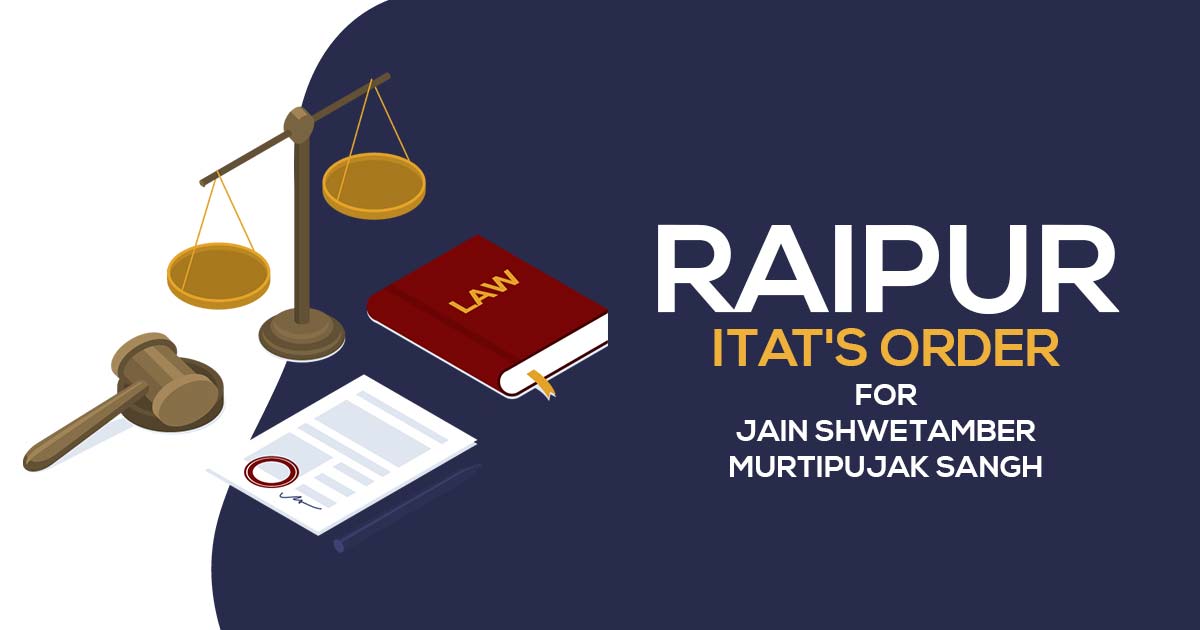
In a ruling, the Income Tax Appellate Tribunal (ITAT), Raipur bench has instructed the Income Tax Department to allow the delayed filing of Form 10B. However, the condition was provided by the bench that it should be filed before the “due date” of filing of return of income under Section 139 of the Income Tax Act, 1961.
The appellant assessee, Jain Shwetamber Murtipujak Sangh, is a religious-cum-charitable trust registered with the CIT (Exemption), Bhopal, under Section 12AA(1)(b)(i) of the Income Tax Act, 1961. The assessee trust has been registered following an order dated July 11, 2016, which is in effect after April 1, 2015. After claiming an exemption under Section 11 of the Act, the assessee trust e-filed its return of income under Section 139(4) of the Income Tax Act, 1961 declaring zero income.
The DCIT, CPC, Bangalore, issued a notification on March 29, 2019, declining the assessee’s request for an exemption under Section 11(2) of the Income Tax Act, citing that such a request could only be granted if the Return of Income form was filed electronically by the “due date” specified in Section 139(1) of the Act.
On June 21, 2019, the assessee submitted Form 10B and appealed to the CIT (Appeals), along with a request for correction of the error under Section 154 of the Act.
In view of the appeal, the CIT (Appeals) noted that the assessee trust had submitted Form 10B r.w.r. 12(2) of the Income Tax Rules, 1962, on June 21, 2019, which was well after the “due date” for submitting its return of income under Section 139 of the Act. The CIT(Appeals) observed that the delay in filing Form 10B could only be condoned if Form 10B was filed before the “due date” of filing of return of income under section 139 of the Act.
However, it has been questioned by the Departmental Representatives (DR) that since the assessee-trust was bound to e-file/upload its “audit report” under Section 12A(b) of the Act in Form 10B, its return of income for the year is under consideration, which he did not file. Therefore, the DCIT duly rejected the assessee’s entitlement for exemption under Section 11 of the Act.
Read also: Correct Income Tax Return Filing Due Dates for FY 2022-23
A single-member bench of Ravish Sood, Judicial Member noted that The assessee-trust does not cumulatively meet the set of requirements outlined in Paragraph 4(i) of CBDT Circular No. 10 (supra), and it has not filed any applications for a delay condonation under Section 119(2)(b) of the IT Act as provided in Paragraph 4(ii) of the said circular. Accordingly, there is no justification for condoning the assessee-trust’s delay in filing Form 10B.
The decision of rejecting the assessee’s request for exemption under Section 11 of the Income Tax Act was upheld by the ITAT. However, the bench reinstated the issue to the file of the A.O. with an order to take the assessee’s claim into account for the deduction of expenses as debited in the income and expenditure account.
| Case Title | Shri Jain Shwetamber Murtipujak Sangh |
| Citation | ITA Nos. 15 & 16/RPR/2022 |
| Date | 22.05.2023 |
| Assessee by | S/Shri Sunil Kumar Agrawal & Madhu Sudan Sawdia, CAs |
| Revenue by | Shri Piyush Tripathi, Sr. DR |
| Raipur ITAT | Read Order |